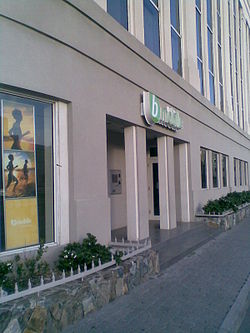- Telecommunications in the British Virgin Islands
-
Telephones - main lines in use: 11,700 (2002)
Telephones - mobile cellular: 8,000 (2002)
Telephone system: worldwide telephone service
general assessment: worldwide telephone service
domestic: NA
international: country code - 1-284; connected via submarine cable to Bermuda; the East Caribbean Fiber System (ECFS) submarine cable provides connectivity to 13 other islands in the eastern Caribbean (2007)Radio broadcast stations: AM 1, FM 5, shortwave 0 (2004)
- ZBVI-AM 780 Tortola
- ZJKC-FM 90.9 Tortola
- ZGLD-FM 91.7 Tortola
- ZCCR-FM 94.1 Todman's Peak
- ZWVE-FM 97.3 Tortola
- ZKNG-FM 100.9 Chalwell
- ZROD-FM 103.7 Tortola
- ZVCR-FM 106.9 Chalwell
Television broadcast stations: 1 (ZBTV), (plus one cable company) (1997)
Internet Service Providers (ISPs): 1 (1999)
Internet country code: .vg
Internet hosts: 465 (2008)
Internet users: 4,000 (2002)
- See also : British Virgin Islands
Deregulation of the telephone market
In 2006, the British Virgin Islands government undertook a deregulation of the telephone industry.[1] Prior to 2006, in common with many other Caribbean countries, Cable & Wireless (Caribbean) had a statutory monopoly[2] on telephone and other electronic communications services. However, in the 1990s, a local company called CCT Boatphone, which had previously provided radio boatphones to tourists on charter boats, expanded into cellular (mobile) telecommunications for land-based users. Although technically in breach of the statutory monopoly, CCT Boatphone was backed by a powerful collection of local interests known as the BVI Investment Club. Negotiations between Cable & Wireless and CCT Boatphone led to a split of the monopolies, with Cable & Wireless retaining a monopoly over fixed line and internet services, and CCT Boatphone keeping a de facto monopoly over cellular telephones.
In 2007 the Government abolished the previously existing monopolies under an order made pursuant to the new legislation. The process proved politically fraught, and the Government's Minister for Communications and Works, Alvin Christopher, ended up leaving the Government and joining the opposition party as a result of the furore. The process was also criticised as cumbersome and slow, the initial deregulation having been announced in 2004, and taking no less than three years to come to fruition through delays in legislation and regulation.
Although there have been no new entrants into the fixed line industry, the government issued three licenses under the new regime to cellular telephone service providers. The existing provider, CCT Boatphone, obtained one license. Bmobile, the cellular arm of Cable & Wireless, obtained a second. The third license was obtained by BVI Cable TV, a local cable television service. The license in favour of BVI Cable was controversial, as the Regulator had announced in advance that only three licenses in total would be issued, and BVI Cable TV had crumbling cable television infrastructure, and was in no position to office cellular telephone services (and to date, has not offered any cellular telephone services, or anything other than simple cable television). However, bmobile's main regional competitor, Digicel, was rejected for a license. The decision was regarded as highly controversial in the local media.[3]
Digicel then issued court proceedings against the Regulator, arguing that he had acted improperly by imposing an arbitrary limit of three licenses (although interestingly no complaint was made about the decision to prefer BVI Cable TV's improbable license over Digicel). Bmobile was joined to the suit as an interested party. High Court Judge Rita Joseph-Olivetti found in favour of Digicel and quashed the original decision.[4] Digicel commenced separate proceedings against Cable and Wireless (as bmobile's parent company) in the English courts, claiming that Cable & Wireless has unfairly stifled competition in several Caribbean jurisdictions.[5] During the intervening period, bmobile has obtained a virtual stranglehold on the cellular telecommunications market in the British Virgin Islands by a combination of low prices and aggressive advertising, as well as significant investment in infrastructure and technology.[6]
[7] Digicel was finally granted a licence on 17 December 2007 and plans to start operations in the BVI sometime in 2008. [7][8] and [9]
References
- ^ Telecommunications Act (No 10 of 2006)
- ^ Under the Cable and Wireless (West Indies) Limited Telephones Act, 1975 (Cap 168)
- ^ BVI Platinum news, 23 May 2007 and BVI Platinum news, 4 June 2007
- ^ BVI Platinum News, 25 May 2007
- ^ BBC World news, 19 July 2007
- ^ BVI Platinum news, 8 June 2007 and BVI Platinum news, 25 June 2007
- ^ a b 7
- ^ Caribbean Net News: British Virgin Islands
- ^ Jamaica Gleaner News - Digicel to take on two new markets - Investing US$15m in BVI roll-out, bids US$80m for Honduras licence - Friday | December 21, 2007
 This article incorporates public domain material from websites or documents of the CIA World Factbook.}
This article incorporates public domain material from websites or documents of the CIA World Factbook.}Communications in North America Sovereign states Dependencies and
other territories- Anguilla
- Aruba
- Bermuda
- Bonaire
- British Virgin Islands
- Cayman Islands
- Curaçao
- Greenland
- Guadeloupe
- Martinique
- Montserrat
- Navassa Island
- Puerto Rico
- Saint Barthélemy
- Saint Martin
- Saint Pierre and Miquelon
- Saba
- Sint Eustatius
- Sint Maarten
- Turks and Caicos Islands
- United States Virgin Islands
Categories:- Communications in the British Virgin Islands
Wikimedia Foundation. 2010.

